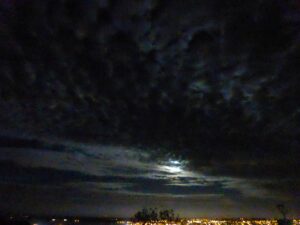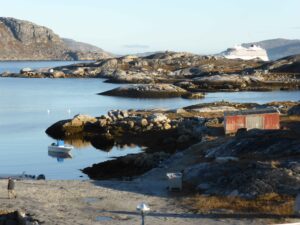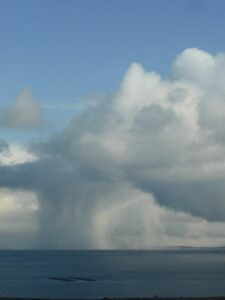
I’m writing this in a total whiteout. I can’t see anything, and I half expect a shoal of fish to swim past the window. Continue reading Parallel Realities

I’m writing this in a total whiteout. I can’t see anything, and I half expect a shoal of fish to swim past the window. Continue reading Parallel Realities

Stuck out in the North Atlantic on a cruise ship that was dodging the weather last autumn, I found myself thinking about just how much we take our world for granted. This year, an exceptionally active hurricane season has affected both sea and land. The impact on the land is well documented in news broadcasts. That over the sea might be considered to be less but, it can be significant nonetheless.
We still rely on marine transport systems for many goods to travel from one continent to another. Tourism, and in particular the cruise industry, has become a major economic force. Itineraries are drawn up under the assumption that the journey from one exotic destination to another will be ‘plain sailing’. The ironic significance of the phrase is no longer lost on me, though one has, perhaps, to experience severe travel disruption before its impact in the days of sail can be fully realised.
When a cruise vessel has to change plans, the knock on effect is twofold. Firstly, there is the ship: those on board find that their holiday plans remain unfulfilled, while the company may see its profits dwindle as alternative plans, and routes, are put into place. Secondly, there are the communities that were set to play host. Many of these are surprisingly small, often with fragile economies. Tours are cancelled, guides have an unexpected day off, there is likely to be a glut of cake and scones as cafes face up to a lack of expected customers.
Somehow, it comes as a shock to everyone.
And yet, the weather remains one aspect of the modern globe that we cannot control. Surely we should not be surprised. The last few decades have been, on balance, pretty stable. Perhaps we have been lulled into a false sense of security. Or superiority. Travel, and transport, are part of the foundations of twenty-first century society and we have come to take it for granted that they will work as planned. I doubt that the Norse seafarers who crossed this section of the ocean with monotonous regularity felt quite the same. Neither, I suspect, did the crews of the clippers and other sailing vessels who worked their way across the seas. Much less the prehistoric groups who made their way along the coasts of northwest Europe at the end of the Ice Age.
I feel that one, unlooked for, aspect by which one might define society today and contrast it with earlier communities, is that we have become arrogant. Somehow I don’t think that they had quite such unshakeable belief that their technologies could master whatever the world might throw at them. Yes, they built endless stone circles, ceremonial centres and sacred places through which we assume they sought to propitiate their gods and ensure the future of the human race. But somehow one gets the impression that they were working with the world rather than against it. They encompassed a degree of flexibility in their lives. We, in contrast, seem to have set ourselves up against the forces of nature. And we are less flexible.
I’d prefer to return to a broader view of the world and our place in it. It might be a slower path, the outcome might be more uncertain, but it is, I think, the only way that our future can be assured.

The vagaries of recent days have reminded me of one of the big differences that I have experienced since I moved north. Here, I experience the weather totally differently to the way in which it got me when I lived in the city.
In the city the weather was something that you felt. It was cold, or it might be wet, sometimes it was windy, occasionally it was hot. Here, there is so much more variety to it. For starters, the weather is something that you see, almost more than you feel. I love to watch big storms swirling across the sea towards the house. Once upon a time I found it hard to imagine the properties of air as something visual apart from the obvious times when fog or darkness interrupted my vision. Today I find myself obsessed with the sky and the clouds. I’m constantly looking up to see what is coming and from where. Sometimes it is just for the sheer beauty of it. Sometimes it helps me to prepare before I go out. Can I hang the washing out? Only if the white horses on the sea are not very pronounced. Which way round should I park the car? Bitter experience has taught me of the power of the wind on an open car door – more than once (I’m not a fast learner).
It has made me realise just how much our modern lives differ from those of the people we study in the past. It is not just the big things – stone tools and the lack of electricity. It is the total immersion in everything. It is hard enough for us to appreciate the way in which life can hang in the balance for the small scale subsistence farmer in a marginal environment. But the emotional experience of living is just so different as you travel back. No modern medicine – alters your perception of death; no fridges and freezers – alters your attitude to food; no central heating – alters your feelings about cold, clothing and food (have another look at War and Peace); no combustion engine – alters your perception of distance and home; no social networking – alters your understanding of friendship and communication. It doesn’t mean that we should not attempt to unpick the lives of our ancestors. But it does mean that we need to be aware of the boundaries within which we work.
I heard an interesting story on the radio about the problems of getting information from people today. Apparently, if you ask a simple question of a group of 100 men and 100 women you tend to get very different answers from the men to the women, whereas mathematically the patterning should be similar. But if you suggest that you will be checking the veracity of their answers, the difference vanishes. This, the presenter said, demonstrates the unpredictability of people. Left to our own devices we often ignore the rules. It is an elegant illustration of the conundrum that lies at the heart of archaeology. As archaeologists we rely on the predictability of the people of the past and our own empathy with their imagined lives in order to build our interpretations of the evidence that we find. Sadly, not only are people unpredictable, but also our empathetic powers might have limitations.
So, archaeology is challenging – no news there. The upside is that as long as we take it on board that we are just creating and refining stories, there is always another one, another version to be woven out of the threads of understanding that we learn to play with every day.
You must be logged in to post a comment.